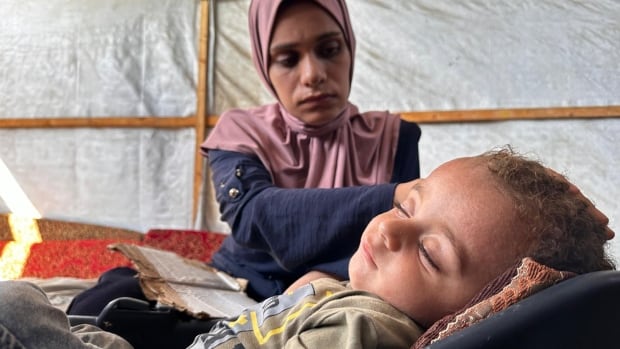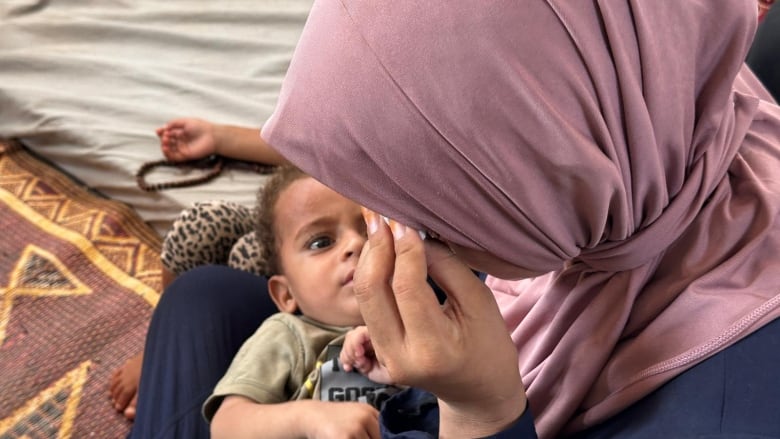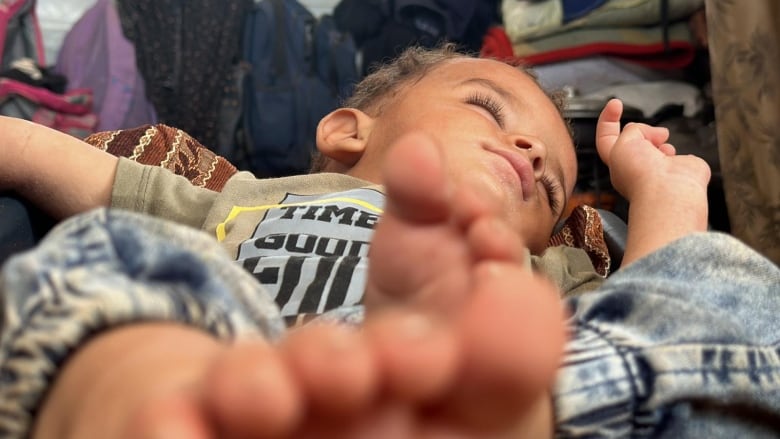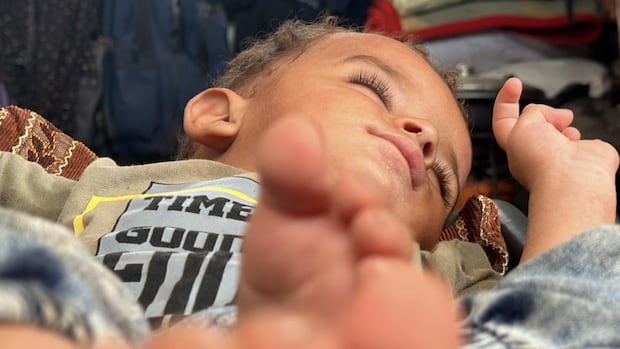
Nafin Abu Al-Jidyan, 37, tries giving her baby boy some water from a sippy cup, as he shakes his head from left to right in protest. His left leg lies completely still as the rest of his body squirms in a car seat. The stiffness is a symptom of polio, the highly infectious disease slowly taking over the 11-month-old’s little body.
Abdul Rahman, who is not yet vaccinated against the virus, contracted polio in August, the first case in Gaza in 25 years, the World Health Organization confirmed.
In September, he’ll turn one, around the age when Abu Al-Jidyan’s eight other children took their first steps.
“He’s not crawling; he’s not walking,” his mother said as she picked Abdul Rahman up and held him in her lap surrounded by his siblings inside the family’s tent at an internally displaced person’s camp in Deir al-Balah.
“He doesn’t move his limbs properly. He doesn’t lift his arms properly. His neck is weak.”
Polio is preventable, but once contracted is highly contagious. It’s spread through mouth contact with food, water or cough or sneeze droplets infected with the virus. In most cases, symptoms go away on their own, but in about one per cent of cases, the virus damages the nervous system, causing muscle weakness and paralysis that can be permanent.
Abu Al-Jidyan fears that could be the case for Abdul Rahman.
“Abdul Rahman [used to] crawl and move around, but sadly, the disease made him immobile” she said as the 11-month-old lay asleep in a car seat and she and his father took turns fanning him with a piece of cardboard in an attempt to keep him cool in the desert heat.
(Early media reports put Abdul Rahman’s age at 10 months, but his family confirmed he is 11 months old.)
There is no treatment for polio, but some symptoms can be improved with physical therapy and pain medications.
First detected in July
Type 2 poliovirus was first detected in Gaza wastewater samples in July. At the time, the Gaza Health Ministry called the findings a “health disaster.”
In response, the Israel Defence Forces (IDF) co-ordinated a vaccine booster campaign for Israeli troops deployed in Gaza and said they would allocate vaccine doses for Palestinians, with the help of aid groups.
Eleven-month-old old Abdul Rahman Abu Al-Jidyan contracted polio in August. His mother, Nafin, told CBC freelance videographer Mohamed El Saife in Deir al-Balah that the child’s symptoms started with a fever and eventually progressed to paralysis in his left leg.
This week, enough doses to immunize 640,000 kids entered Gaza. And, in a post on Telegram, the IDF said the doses coming through the Kerem Shalom border are “tailored to the virus found in environmental samples” inside Gaza.
Gaza’s polio situation is “absolutely catastrophic,” Tess Ingram, a UNICEF spokesperson based in Amman, Jordan, told CBC.
“It’s really worrying, because it means that there could be a risk of other children with polio symptoms, including paralysis.”
‘Polio does not respect borders’
Abu Al-Jidyan suspects poor sanitation contributed to her baby developing polio. She says he was crawling in dirty spaces and drinking water that may have been contaminated.
He first developed a fever and started vomiting. She took him to Al-Aqsa Hospital in Deir al-Balah, whose staff ran tests on a stool sample and sent them to Jordan. Medical staff there confirmed that he had contracted Type 2 poliovirus. He eventually became partially paralyzed.
Polio was eradicated from the occupied Palestinian territories (which include the West Bank) 25 years ago, but the current war between Hamas and Israel has destroyed much of Gaza’s sanitation systems. International organizations have reported raw sewage flowing through displacement camps, most of which have poor sanitation facilities.

In 2022, before the current war, the polio vaccination rate in the Gaza Strip and the West Bank was near 99 per cent.
But nearly 11 months into the conflict, that rate has declined to below 90 per cent, said Ingram. That’s in part because of the widespread upheaval the war has caused, forcing around 1.9 million civilians into displacement camps in a small area of central Gaza, and the decimation of Gaza’s hospitals and health care infrastructure.
“We need about 95 per cent [vaccine] coverage to help prevent transmission of the poliovirus,” said Ingram.
But she also stressed the importance of a ceasefire to help stop the spread of the disease beyond Gaza.
“Polio does not respect borders.”
The Israel-Hamas war began after an Oct. 7 Hamas-led attack on southern Israel killed about 1,200, with another 250 taken hostage, according to Israeli figures. Israel’s subsequent military incursion into the strip has killed around 40,000 Palestinians, according to the Gaza Health Ministry.
Hope for a good life
As she described her family’s predicament, Abu Al-Jidyan stroked Abdul Rahman’s cheeks gently and wondered aloud what her youngest child’s future would look like.
Born into a war, the boy hasn’t yet known a normal life and is heading into his first birthday with the prospect of permanent paralysis looming over him.

The family has been displaced more than five times throughout the war and is now even more isolated as neighbours fear contracting the virus.
“People look at us from a distance,” said Amjad Saeed Abu Al-Jidyan, the boy’s father. “They move away from us and the boy, so they don’t catch it.
His mother is worried about her other kids, too, who are in close contact with their brother, sharing a small tent.
She said she hopes that Abdul Rahman might eventually be allowed to travel abroad so he can get better medical care and “have his rights to a [good] life.”
